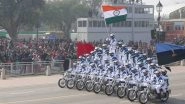Rio de Janeiro, May 31 (AFP) The economic and political stakes are high as Rio de Janeiro and Sao Paulo wrestle for the right to host the Brazilian Formula One Grand Prix.
Interlagos in Sao Paulo hosted the first Brazilian Grand Prix in 1973 and has been home for every edition since 1990, but its contract expires after next year's race.
For F1 it is a tricky and important decision. The sport's largest audience is in Brazil, with 115.2 million viewers watching at least one GP in 2018, far ahead of China (68 million) and the United States (34.2 million).
On May 8, Brazilian President Jair Bolsonaro, a member of parliament for Rio for 30 years, announced with great fanfare that the Brazilian Grand Prix would be held "next year" in Rio, at a circuit "built in six or seven months".
F1 leadership quickly said that Sao Paulo will host the 2020 race and Rio is simply a candidate to organise the event from 2021.
JR Pereira, CEO of the Rio Motorsports consortium said they had made a "communication error in briefing the president's team. In reality, the planned duration of the work is 16 to 17 months".
Joao Doria, the Sao Paulo state governor, said the race was not moving.
"The GP will take place in Interlagos in 2020 and will stay here, Doria said. "If Rio wants to compete with Sao Paulo, I can guarantee that Sao Paulo has a better chance of winning."
The Rio project is ambitious. It is for a circuit that can seat 130,000 - more than double Interlagos - on a layout by German architect Hermann Tilke, who has already designed 'Tilkedromes' in Hockenheim, Shanghai and Sepang.
The estimated budget of 697 million reais (about 155 million euros) is supposed to be financed entirely by the private sector.
"We were served the same speech at the time of the World Cup 2014 and the Olympic Games 2016, but in the end, there will inevitably be public money," said Victor Martins, director of Grande Premio, Brazil's leading motor sport news website.
- Minefield -
=============
"It is above all a political arm-wrestling match," said Martins, saying City and state politicians "want to show strength" and adding that Doria has made clear he plans to run against Bolsonaro in the 2022 elections.
Pereira says he dreams of a Spa-Francorchamps in the tropics, with the "fast track" of the Belgian circuit, while the project "tries to preserve as much green space as possible."
But the environment could become the Achilles' heel of the project in Deodoro, a working-class district in western Rio where some of the Olympic Games-2016 facilities were built.
The site is a minefield -- literally. It was used for training by the army.
The Federal Prosecutor's Office requested the suspension of the tender in the absence of environmental impact studies. But, in the absence of other bids, the consortium were declared the winners by the Rio city government on 20 May.
Pereira says the study has already been commissioned and that work will only begin only "once the necessary licences have been obtained".
His consortium is in a race against time to deliver a track even by November 2021. "It's clear that F1 would like to have a race in Rio, but it's not enough to snap your fingers to build a racetrack and organise a race," said Martins. AFP
(The above story is verified and authored by Press Trust of India (PTI) staff. PTI, India’s premier news agency, employs more than 400 journalists and 500 stringers to cover almost every district and small town in India.. The views appearing in the above post do not reflect the opinions of LatestLY)













 Quickly
Quickly


